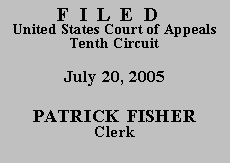

| JAMES T. FISHER,
Petitioner-Appellant , |
|
| v. | |
|
JOHN WHETSEL, |
|
Mr. Fisher was convicted of first-degree murder in Oklahoma County District Court and sentenced to death in September 1983. In March 2002, we granted Mr. Fisher habeas corpus relief because his trial counsel was so "grossly inept" that his representation constituted ineffective assistance of counsel under Strickland v. Washington, 466 U.S. 668 (1984). See Fisher v. Gibson, 282 F.3d 1283, 1298 (10th Cir. 2002). We granted the writ of habeas corpus subject to the condition that the State of Oklahoma retry Mr. Fisher within a reasonable time "or be subject to further federal proceedings to consider his release." Id. at 1311.
In January 2004, the State appointed Mr. Fisher new counsel. His second trial was scheduled to begin on December 6, 2004. On December 3, 2004, Mr. Fisher filed in the federal district court an Emergency Motion and Petition in Support for a Writ of Habeas Corpus and Request for Emergency Stay of State Court Proceedings. The basis for his motion and request for stay was that he was receiving ineffective assistance of counsel in preparation for the retrial.
The district court dismissed the petition upon filing under the abstention doctrine delineated by the Supreme Court in Younger v. Harris, 401 U.S. 37 (1971). Mr. Fisher then filed a motion under Federal Rule of Civil Procedure 59(e) to alter or amend the judgment and sought a COA. The district court denied the motion to alter or amend the judgment and denied a COA. Mr. Fisher now seeks a COA so he may appeal the district court's dismissal of his 28 U.S.C. § 2254 petition. We exercise jurisdiction under 28 U.S.C. § 2253 and deny his requests for a COA and IFP status.
Issuance of a COA is jurisdictional. Miller-El v. Cockrell, 537 U.S. 322, 336 (2003). A COA can issue only "if the applicant has made a substantial showing of the denial of a constitutional right." 28 U.S.C. § 2253(c)(2). "A petitioner satisfies this standard by demonstrating that jurists of reason could disagree with the district court's resolution of his constitutional claims or that jurists could conclude the issues presented are adequate to deserve encouragement to proceed further." Miller-El, 537 U.S. at 327. "The COA determination under § 2253(c) requires an overview of the claims in the habeas petition and a general assessment of their merits." Id. at 336. "This threshold inquiry does not require full consideration of the factual or legal bases adduced in support of the claims. In fact, the statute forbids it." Id. While Mr. Fisher is not required to prove the merits of his case in applying for a COA, he must nevertheless demonstrate "something more than the absence of frivolity or the existence of mere good faith on his or her part." Id. at 338 (internal quotation marks omitted).
With these principles in mind, we have carefully reviewed the record of these proceedings. As the district court noted, it has long been the policy of the federal courts not to interfere with pending state criminal prosecutions, except in narrow circumstances where irreparable harm is demonstrated. See Younger, 401 U.S. at 43-44.
In determining whether Younger abstention is appropriate, a court considers whether: (1) there is an ongoing state criminal, civil, or administrative proceeding, (2) the state court provides an adequate forum to hear the claims raised in the federal complaint, and (3) the state proceedings involve important state interests, matters which traditionally look to state law for their resolution or implicate separately articulated state policies.
Crown Point I, LLC v. Intermountain Rural Elec. Ass'n, 319 F.3d 1211, 1215 (10th Cir. 2003) (quoting Amanatullah v. Colo. Bd. of Med. Exam'rs, 187 F.3d 1160, 1163 (10th Cir. 1999)). If these three conditions are met, Younger abstention is non-discretionary and, absent extraordinary circumstances, a district court is required to abstain. See Seneca-Cayuga of Okla. v. Okla. ex. rel. Thompson, 874 F.2d 709, 711 (10th Cir. 1989).
We agree with the district court's assessment of Mr. Fisher's claim under the Younger abstention doctrine. It is undisputed that when the district court denied habeas relief and the emergency stay motion in December 2004, the scheduled trial was an ongoing criminal prosecution. The record reflects no reason to believe otherwise. Mr. Fisher states that he was convicted at retrial in April 2005. Because he may present a claim for ineffective assistance of counsel in a direct appeal to the Oklahoma Court of Criminal Appeals, he has an adequate state forum in which to adjudicate his federal claims. Oklahoma's important interest in enforcing its criminal laws through proceedings in its state courts remains axiomatic. Finally, Mr. Fisher did not allege any exception to the Younger doctrine that would permit the federal court to intervene, such as bad faith, harassment, or other exceptional circumstances. See Middlesex County Ethics Comm. v. Garden State Bar Ass'n, 457 U.S. 423, 435 (1982) (applying the Younger doctrine when these three conditions are met "so long as there is no showing of bad faith, harassment, or some other extraordinary circumstance that would make abstention inappropriate").
III. CONCLUSION
Having reviewed Mr. Fisher's brief, the record, and the applicable law, we conclude Mr. Fisher has raised no issues that are debatable or adequate to deserve encouragement to proceed further. See Miller-El, 537 U.S. at 327. We therefore DENY a COA, DENY as moot his request to proceed IFP, and DISMISS his appeal.
Entered for the Court,
Robert H. Henry
Circuit Judge